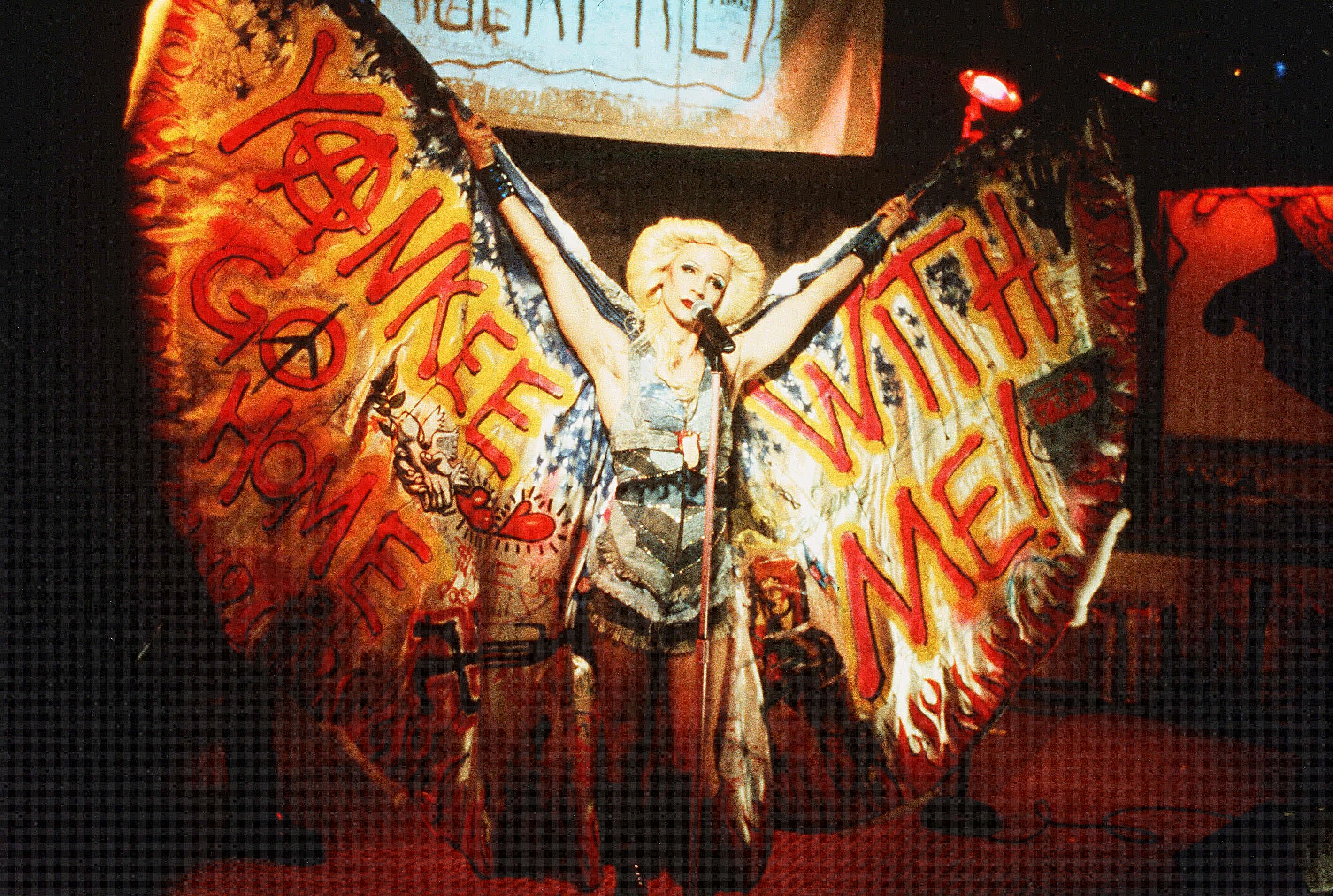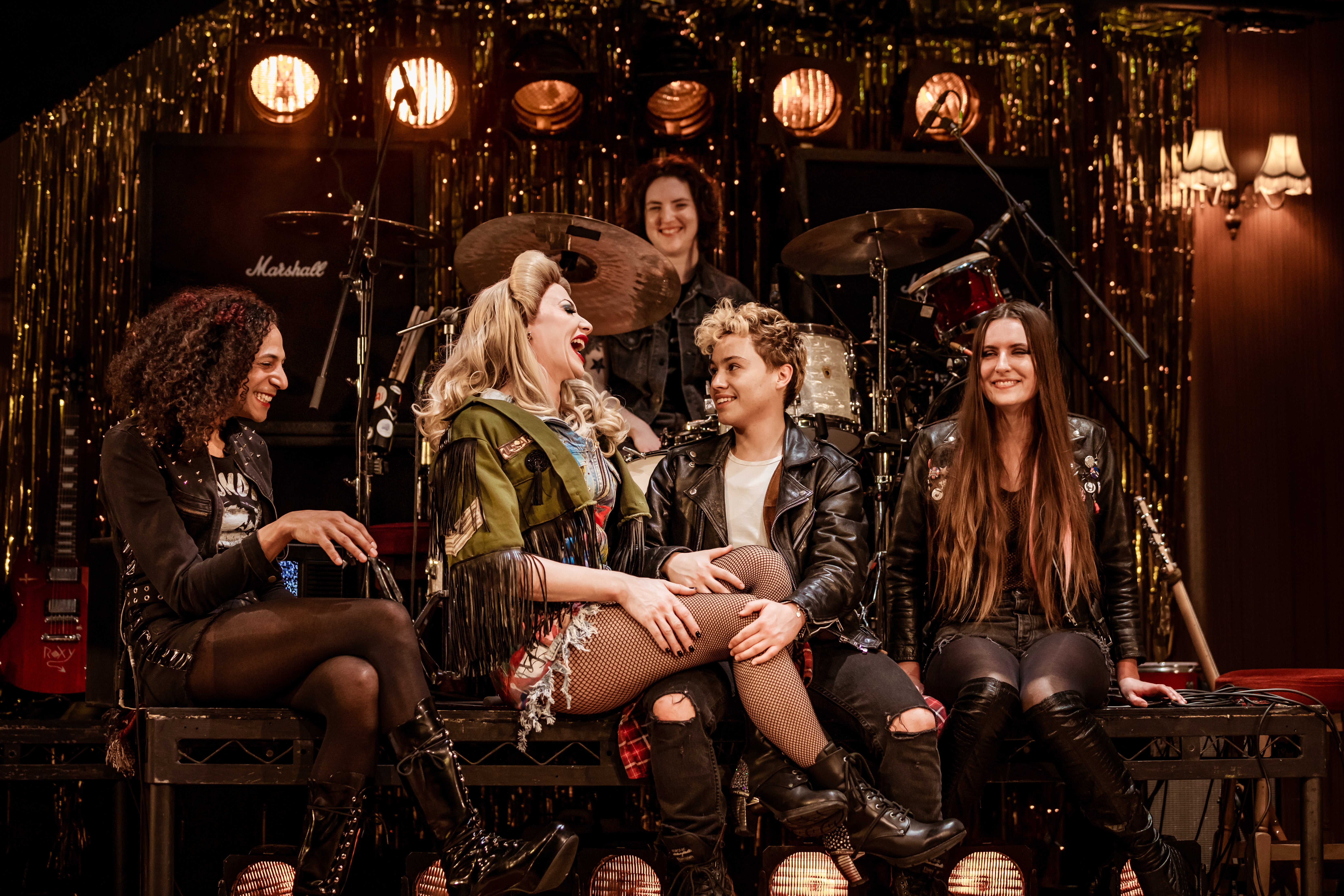Divina de Campo: ‘I’m constantly referred to as madam, even with a shaved head’
The ‘Drag Race UK’ finalist can be seen licking faces and riding car bonnets in a new staging of cult musical ‘Hedwig and the Angry Inch’. They talk to Isobel Lewis about gender, problematic characters, and educating a generation whose knowledge of queer history starts and ends with RuPaul


Your support helps us to tell the story
From reproductive rights to climate change to Big Tech, The Independent is on the ground when the story is developing. Whether it's investigating the financials of Elon Musk's pro-Trump PAC or producing our latest documentary, 'The A Word', which shines a light on the American women fighting for reproductive rights, we know how important it is to parse out the facts from the messaging.
At such a critical moment in US history, we need reporters on the ground. Your donation allows us to keep sending journalists to speak to both sides of the story.
The Independent is trusted by Americans across the entire political spectrum. And unlike many other quality news outlets, we choose not to lock Americans out of our reporting and analysis with paywalls. We believe quality journalism should be available to everyone, paid for by those who can afford it.
Your support makes all the difference.For Divina de Campo, drag has always been a tool for education. When the singer and performer sashayed into the nation’s hearts on the first series of RuPaul’s Drag Race UK in 2019 – armed with a four-octave vocal range and a distinctive, shriek-like laugh – their Instagram was flooded with messages thanking them for discussing having lived under Section 28. For many of the show’s teenage fans, Divina talking about Margaret Thatcher’s law – which banned the “promotion of homosexuality” by public institutions – was the very first time they had learnt about it. “There’s a bit of you that has to take people by the hand and say, ‘This stuff is also part of our history,” the 37-year-old explains.
With an army of followers to their name, Divina – who identifies as non-binary – is barrelling forward with this mission by starring in a new staging of the cult-classic musical Hedwig and the Angry Inch. Co-produced by Leeds Playhouse and Home in Manchester, it’s a production clearly meant to appeal to Drag Race fans, who can pay extra for a meet-and-greet experience with Divina after certain shows. Pausing from an intense day of rehearsals to speak over Zoom, they tell me it’s an opportunity to enlighten a generation – many of whose knowledge of queer culture starts and ends with the Drag Race franchise – about Hedwig and beyond. “How many people [today] know about what happened in the Eighties or the Seventies or the Sixties?” the Yorkshire-born performer says. “They don’t, because the world is so complicated already [and] our systems are designed so that you don’t have time to find things out.”
Divina remembers their own introduction to Hedwig, too. Every weekend, they and their boyfriend would go to Blockbuster and pick out DVDs to watch (“That’s how old I am!”). Divina would often thumb a copy of the 2001 Hedwig film adaptation, only for their boyfriend to say he wasn’t interested. In the years after, it remained unrented, if an “intriguing and interesting” mystery. Only in 2007, while working as an entertainer in Ibiza, did they finally watch it. They describe the experience as a “sucker punch”. “It was a seminal moment of, ‘This is amazing, why has this not been part of my life until now?’”
Hedwig herself is unforgettable. An “internationally ignored” singer hailing from communist East Germany, she was assigned male at birth and later survived a botched gender-reassignment operation. It left her with that titular “angry inch” between her legs – “Six inches forward, five inches back,” she chants. We meet her and her band on a makeshift tour across the UK, playing the dive bars across the street from wherever her rock-star ex Tommy Gnosis is playing. He’s also stolen all of her songs. Hedwig is a face-licking, lap-grinding, vehicle-smashing heroine, while the show surrounding her fizzes like a sparkling microphone. Live comedy, Platonian theory, complex vocals and dirty jokes crash aggressively into each other.
When it was announced that Hedwig was not only being revived in the UK (it last played in the West End in 2000), but that Divina would play the lead role, fans hailed the inspired casting. On Drag Race, they were known for their soprano voice and whistle-tone pitch. They also had a history of musical theatre work, most recently playing the role of reporter Mary Sunshine – a part usually reserved for cisgender female actors – in a UK tour of Chicago.
Divina’s experience as a drag performer, hosting shows and dealing with rowdy audiences, allows them to play into the unique feel of the production, which fuses theatre with a rock concert. Divina describes their Hedwig as a Lady Gaga-Freddie Mercury hybrid, drawing on Gaga’s “punk rock, ‘up yours, I’m going to do whatever I want’” energy. Their specific interpretation folds into the lineage of Hedwig casting, with each actor who’s played the role making her their own. For John Cameron Mitchell, who originated the role on stage in 1998 and in the film, it was her pencil-thin eyebrows. In the glossy 2014 Broadway revival, Neil Patrick Harris wore sharp lines of pink blush across his cheeks like slaps. The Hedwig portrayed by Divina is more natural in appearance, with softer brows and a lack of colour in the face.

Other elements of this new revival are similarly unique. Director Jamie Fletcher is trans herself, while Divina explains that its cast is “primarily” made up of “trans, non-binary and queer people”. Knowing that many of the audience will include gender-nonconforming people too, the team are also conscious of what the show says on stage. LGBTQ+ people keep coming back to Hedwig because of its ever-relevant conversations about gender and the fluidity of identity. But it’s also very much a product of 1998, and littered with yikes-worthy moments that the revival’s key creatives wanted to interrogate. As I speak to Divina, they tell me that the cast had just that morning been discussing the way Mitchell’s script refers to Korean army wives as “comfort wives”.
“The choice has to be: does it drive the story and the narrative, or is it something that doesn’t,” Divina says. “Does using language that is basically racist and also based in exploitation drive the story [forward] or can we frame it in a slightly different way? ... We’re not taking the edge off Hedwig, she still is a very edgy character and problematic in so many different ways. But we’re definitely looking at this with more of a 2022 sensibility.”
‘We’re not taking the edge off Hedwig... but we’re definitely looking at this with more of a 2022 sensibility’
It’s clear that the show’s creative process has been handled with compassion and understanding. Divina says they’ve been in productions before where cisgender men have played trans roles and, comparatively, this Hedwig has been an “enriching” experience. “You don’t have to do the baby steps at the beginning of, ‘OK, this is what a trans experience is like’, ‘this is what it’s like to grow up gay’. We’ve all lived it, we’ve all already been there and done it and I feel like that gives you a much deeper, richer product.”
They continue: “I have been in pieces where there have been trans characters played by straight, cis men and the journey that you have to take that person on to really understand who this character is just enormous. To the point where, actually, I don’t always think it’s a very good performance.” Divina lets out one of those signature cackles. “I think they’re a bit s***, to be honest… That isn’t to say that you can’t play a psychopathic murderer or the king of the world or whatever. You can, but… you watch [Russell T Davies’s HIV drama] It’s a Sin and the reason why the performances are so powerful is because so many of those people on that production were LGBTQ+. They’re bringing all of that knowledge, all of that experience with them.”

Divina interprets Hedwig’s gender identity as non-binary and fluid, albeit “more on the femme side of the scale”. Playing Hedwig has made them re-examine their own identity, too. “[If] I’d been through what Hedwig had been through, would I carry on as a woman?” they ask. “Actually I think I would. I’m constantly referred to as madam, even with a shaved head… I get [it] on aeroplanes, on trains, [from] parking attendants…. I don’t have a problem with that, that’s fine. So would that be an issue for me to live full time as a woman?” They think for a minute. “No, it wouldn’t because I certainly don’t miss [living] full time as a man.” They let out that signature laugh again, and it echoes with defiance.
‘Hedwig and the Angry Inch’ runs at Leeds Playhouse until 23 April, and Home in Manchester from 27 April - 11 May



Join our commenting forum
Join thought-provoking conversations, follow other Independent readers and see their replies
Comments